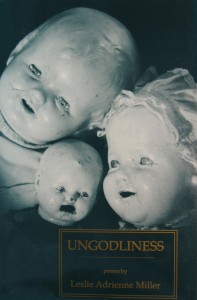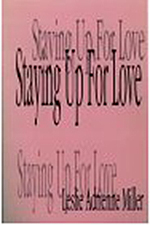 Yesterday Had A Man In It
Yesterday Had A Man In It
Carnegie Mellon University Press, 1998
ISBN: 0887482716
Leslie Adrienne Miller’s poems are tickets to some fascinating places– scary, fantastic places like Indonesia and Berlin and Zanesville, Ohio; the riot-torn country of adolescence; the tough villages of family and friendship; and, again and again, the dark, trackless, lovely forests of desire. Writing utterly from within her own skin, from her specific heart housed in her exact, particular bones, she’s a poet also and absolutely of the larger world, of foreign places, foreign tongues, and she writes about the other as intimately as if she shared its blood.” —Lon Otto
“The central figure of this glittering set of poems is a heroine in the grand manner. Like Colette or Jean Rhys, in their literary incarnations, it is not that she is ahead of her time, it is that she is so clearly part of her time. The narrator of this book is displaced, solitary, and full of an ironic self awareness. She is, as well, a Western woman seen in the larger context of the non-Western world. This is a book of confrontation, the abrasions of the self against itself, the narrator against the world around her. This is both a woman’s book and a womanly book, a book in which Miller is always engaging, eloquent, smart, and honest. —Lynn Emanuel
Leslie Adrienne Miller’s meditative narratives are unfailingly thoughtful in their inclusions. “Babes in Toyland” considers the meanings of female beauty. The speaker watches a contemporary rock band and interprets the semiotics of the lead singer. . . . The poem isn’t afraid to think, a quality I seldom find in verse, and one I sorely miss. The music intensifies toward the closure, which is nothing short of apocalyptic: “. . . we are so near the end / that beauty is a mere scrap, a shard / of jewel which can clash and punish. . . .” The personal broadens to include the cultural, a move that expands the poem beyond the claustrophobia of private life into a larger, public saying. —Alice Fulton
Leslie Adrienne Miller’s unflinching new book, her best yet, shows her to be a poet of rich abandon, of sensuous longing and headlong desire for the other turned back against the self, with regret, with fury. I am moved by these poems of independence infused with a dark self-knowledge, with a wry wisdom and tough vulnerability, with a hopefulness she cannot forget, will not forego. These poems enlarge experience and engage life.
—Edward Hirsch
 Ungodliness
Ungodliness
Carnegie Mellon University Press, 1994
ISBN: 0887481736
Ungodliness, Leslie Adrienne Miller’s second collection of poems, is a nearly perfect collection. Not only do the individual poems achieve a balance of form and content, but they work together superbly as a book. Like Wordsworth with his radical departures, Miller . . . reinvigorates iambic meter by infusing it with a nervous vitality and then bending it to serve subject matter far removed from the genteel traditions of blank verse. Her territory is the ‘ungodliness’ of everyday life– the shadow side of human consciousness: the jealousies, resentments, hurts, angers, and wild, often self destructive urges that we normally try to keep hidden. A postmodern romantic, she is fascinated by chaos. But Miller’s impulse isn’t confessional, still less ‘therapeutic.’ Her poetry achieves what is arguably the rarest thing in literature– it doesn’t merely portray individual consciousness, it embodies it in all its headlong, perverse, and often hilarious guises, in language that is supple, energetic, and at times movingly lyrical. —Minnesota Monthly
In Leslie Adrienne Miller’s fine second book, Ungodliness, we hear the voice of a woman unflinchingly coming to terms with her own experience, picking up the shards of spirit, the religious curious of our fallen age, and transforming them into art at once sensuous, personal, skeptical, and true. —Edward Hirsch
Leslie Adrienne Miller knows extraordinary secrets and tells them with searing clarity– about how love is a necessity, a comfort, an itch and an ache, the nexus where hope and fear and the image of the self and the world come together, or (more often) fail to. These lyrical and witty poems are cunningly made, full of insight and self-knowledge, and since that self is open to unflinching honesty and a kind of vulnerable toughness, it’s impossible to read them without confronting ourselves. —Rosellen Brown
 Staying Up for Love
Staying Up for Love
Carnegie Mellon University Press, 1990
ISBN: 0887480969
Miller’s central subject is passion, and her method . . . is that of the narrated lyric . . . . I especially liked ‘My Students Catch Me Dancing,’ a brief meditation on bad– and intentionally private– art, which reminded me of Elizabeth Bishop’s understated poems about poetry. And in ‘The Future of Beauty,’ she recounts the tale of 12-year olds trying to say the word, ‘aesthetic.’ Miller knows what she’s doing, and the poems evidence her formidable control over her medium. –Virginia Quarterly Review
Miller’s craftsmanship shines in measured form and lyrical rhythms, whether she’s brooding the mood of a lover, contemplating childlessness or lamenting the cruelty of a story on the six o’clock news. Her voice is delicate, but rooted in the earthiness of her Midwestern upbringing. These are fine–and accessible–poems.
—Houston Metropolitan Magazine
In this remarkable first collection, Leslie Adrienne Miller’s songs of the body and meditations of the heart reveal those sensual unravelings of experience that bring us both hope and disappointment. In the broken mirrors of her desires Ms. Miller carefully reads the many refractions of the self. This is a subtle and exciting new lyric voice; Staying Up For Love is without doubt one of the most beautiful and heart-breaking first books of recent years. —David St. John
Think of Emily Dickinson’s tightly-laced passion uncorseted and you will be prepared for the delicate sexual intensity which pervades many of Leslie Miller’s poems. Using perfect pitch and an eye for luminous detail, she gives us real bodies in imaginary clothes. This is a first book which yields abundant pleasure. —Cynthia Macdonald
